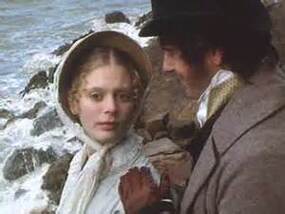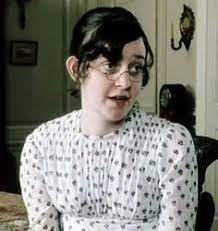| This blog explores social attitudes in Jane Austen's time, discusses her novels, reviews forgotten 18th century novels, and throws some occasional shade at the modern academy. The introductory post is here. My "six simple questions for academics" post is here. |
 Seducing a 15-year-old: Georgiana Darcy and Wickham
Seducing a 15-year-old: Georgiana Darcy and Wickham The author, Susanna Rowson, stated that the tragic tale of Charlotte was based on a true story, and this assertion was emphasized in subsequent editions. An 1860 edition claims: “The house in which the unhappy girl sojourned for a time, and miserably expired, yet stands on the Bowery, New York City, a sad monument of her wrongs, and many indeed are those who have dropped the tear of pity as they gazed upon it….” [It has] been often remarked that no one could read this truthful tale of woe without shedding tears…”
Charlotte Temple opens in England with two idle young army officers watching a queue of pretty young schoolgirls exit a church. One of them in particular catches their eye; she is only fifteen years old. Heroines in novels are often deprived of their mothers through death before the story opens; in this case Charlotte’s mother is alive, but not on hand to safeguard her, and her favorite teacher, Mademoiselle La Rue, is no fit substitute, because she’s French and has a shady past.
 Image generated by Bing AI
Image generated by Bing AI After setting up Charlotte’s situation, we switch to the romantic backstory of her parents, a tale which establishes their bona fides as good and virtuous people. Rowson starts with the familiar portrait of a corrupt aristocratic family that we've seen in so many novels of this era: “Mr. Temple was the youngest son of a nobleman whose fortune was by no means adequate to the antiquity, grandeur, and, I may add, pride of the family. He saw his elder brother made completely wretched, by marrying a disagreeable woman, whose fortune helped to prop the sinking dignity of the house, and he beheld his sisters legally prostituted to old, decrepid men, whose titles gave them consequence in the world, and whose affluence rendered them splendidly miserable.’’
Mr. Temple, a generous young man, learns of a worthy old naval officer languishing in debtor’s prison. He goes to visit him and there our hero sees his lovely daughter Lucy, who earns a little money by painting “fan mounts.”
Mr. Eldridge is there because his son, an aspiring army officer, befriended an older richer officer who offered to loan the money to purchase his commission. But once that commission was obtained, Mr. Lewis turned his lascivious eye on the beautiful Lucy, and made it clear that he expected Lucy to show her gratitude. The indignant brother challenged him to a duel, the brother died, the mother died of grief, and Mr. Lewis demanded immediate repayment of the loan and had dad hauled off to debtor’s prison—a despicable act of corruption and wrong-doing that should be the first story on the nightly news, but, what are you doing to do? Agitate for social and legal changes? Rail against the power inequities that consign him to prison and Lucy to hard graft painting fans? Nope. As old Mr. Eldridge says: “Then let us, my friend, take the cup of life as it is prevented to us, tempered by the hand of a wise Providence; be thankful for the good, be patient unto the evil, and presume not to inquire why the latter predominates.”
Although the amount owed---five hundred pounds—represents Mr. Temple’s annual income, he can’t resist taking out a loan to rescue old Mr. Eldridge. Then, our hero enrages his dad by turning down an heiress “because her mind [was] uncultivated, her heart unfeeling, her passions impetuous, and her brain almost turned with flattery, dissipation and pleasure.”
Mr. Temple and Lucy get married and go off to enjoy the delights of Love in a Cottage. Years go by, and they have but one daughter, Charlotte. That ends the family backstory.
 Fifteen years old
Fifteen years old Back at the boarding school, Charlotte yields, step by step, and does what she knows she shouldn’t do, pushed along by her teacher Mlle. La Rue who alternatively reassures her that it's fine to sneak out to meet men and teases her that she's being a little prude. The two officers, Montraville and Belcour, have notably French-sounding names as well, which would designate them, I suppose, as being of Norman descent, and allied to the aristocracy of England. Lt. Montraville's charms are hard to resist, as the narrator tells us: “A man of an indifferent appearance will, when arrayed in military habit, shew to advantage; but when beauty of person, elegance of manners, and an easy method of paying compliments, are united to the scarlet coat, smart cockade, and military sash, ah! Well-a-day for a poor girl who gazes on him; she is in imminent danger…” We have a Lydia/Wickham situation, but cast for melodrama, not comedy.
Charlotte accepts a secret love note from Montraville; she strolls out to meet with him, she listens to his protestations of love and his offers of marriage. At every step, the author, like a Greek Chorus, warns against the fatal error Charlotte is making. She should have returned the letter unopened. She never should have consented to meet with Montraville, even when with Mlle. La Rue and his friend Belcour in attendance. She should have written to her mother and told her what was happening.
Finally, Charlotte agrees to elope with Montraville because he’s about to embark for America (this novel is set on the eve of the American Revolution, one presumes), and she’ll never see him again if she doesn't. She wavers, the teacher ridicules her, she wavers some more. Finally, she goes to meet with Montraville at the appointed time, resolute in her conviction that she will tell him to leave without her.
| “I cannot go,” said she; "cease, dear Montraville, to persuade. I must not; religion, duty, forbid.” “Cruel Charlotte,” said he, “if you disappoint my ardent hopes, by all that is sacred, this hand shall put a period to my existence. I cannot, will not live without you.” “Alas! my torn heart!” said Charlotte, “how shall I act!” “Let me direct you,” said Montraville, lifting her into the chaise. “Oh! My dear forsaken parents,” cried Charlotte. The chaise drove off. She shrieked, and fainted into the arms of her betrayer. |
 "You're going to need a lot of balm"
"You're going to need a lot of balm" Mlle. La Rue goes along as well, glad to have a new adventure, and she acquires a wealthy new husband on the voyage, Mr. Clayton.
We return briefly to the cottage to witness the anguish of Charlotte's parents and their grandfather.
When Charlotte arrives in America, she realizes that Montraville is not going to make an honest woman of her. He sets her up in a little house in the country, and inevitably grows bored with her.
Montraville’s friend Belcour decides to cut in on the action, and easily deceives Montraville into thinking that Charlotte has been unfaithful to him. This gives Montraville an excuse to abandon her completely, which leaves her destitute.
Charlotte, barely sixteen, is by now carrying Montraville's child, and remorse and regret gnaw at her, especially over the pain she knows her parents must be feeling. A kind neighbor, Mrs. Beauchamp, is briefly able to pour "the balm of consolation” into Charlotte’s heart, but alas, she is called away when the final crisis arrives.
She stumbles into town in the snow, and is taken in by a poor family (servants, in fact, to the cold hearted Mlle La Rue, now Mrs. Crayton, who turns her away from her door). Charlotte gives birth to a daughter, and just as her father arrives from England to bring her back home, she dies, leaving little Lucy to her father's care.
Did our author take advantage of this heart-rending ending to ask for social change? Did Mr. Temple contact the highest authorities in the British army and demand that, in future, officers be cashiered if they abduct fifteen-year-old girls from boarding schools? No mention of that, nor did Charlotte's father take any action against Montraville personally. Mr. Temple says to him: “if you are the seducer of my child, your own reflections be your punishment. I wrest not the power from the hand of the Omnipotent.”
Ten years later, back in London, Mr. and Mrs. Temple come across "a miserable woman lying on the pavement." It is Mlle. La Rue/Mrs. Croyton, suffering the fate her wicked acts brought upon her. Thinking about the judgement she will soon have to face, she confesses her transgressions against Charlotte. "Heaven have mercy!" she exclaims. The Temples, obeying the Christian precept of "hate the sin but love the sinner," get her to a hospital, where she dies, the narrator ending with the observation that Mlle. La Rue is "a striking example that vice, however prosperous in the beginning, in the end leads only to misery and shame.” The End.
 Charlotte hands Lucy to her father
Charlotte hands Lucy to her father The author’s position is very simple, is based upon the prevailing Christian precepts and and social conventions of her day, and is clearly stated: Straying from the Path of Virtue is Bad.
“Oh! My dear girls—for to such am I now writing—listen not to the voice of love unless sanctioned by paternal approbation…" “When once a woman has forgotten the respect due to herself, every libertine will think he has a right to insult her with his licentious passion.” “[R]emember the mother whom you so dearly love will feel the same [sorrows of Mrs. Temple] should you forsake the paths of virtue for those of vice and folly.”
Rowson also preaches blessed are those who help a fallen woman redeem herself.
“Believe me, many an unfortunate female, who has once strayed into the thorny paths of vice, would gladly return to virtue, was any generous friend to endeavor to raise and reassure her: but alas! it cannot be you say, the world would deride and scoff. Then let me tell you, Madam, ‘tis a very unfeeling world…"
Again and again, Rowson stops the narration to exhort her readers: "If the following tale should save one hapless fair one from the errors which ruined poor Charlotte, or rescue from impending misery the heart of one anxious parent, I shall feel a much higher gratification in reflecting on this trifling performance, than could possibly result from the applause which might attend the most elegant finished piece of literature whose tendency might deprave the heart or mislead the understanding."
Despite her conventional moral views, Rowson is now celebrated by academics as a feminist who subversively pushed back against restrictive gender roles. I suppose instead of fulminating against revisionism, as I usually do, I should accept that when academics attribute their own worldviews to women of the past, they are paying the highest compliment they can bestow.

Susanna Rowson (1762-1824) led an unconventional life while promoting high standards of female conduct and conventional morality. She was an actress at a time when, as we know, actresses were assumed to be of loose morals. When she retired from acting, she opened a female academy and operated it for 25 years, making her a successful businesswoman in addition to her other talents. She and her husband had no children--oops, well he had an illegitimate son whom she took into the household, and they also supported a number of dependent relatives. She wrote novels, plays, poems and educational books. She did charitable work for widows and orphans. Born in England, she spent most of her life in America and she was well-known in her lifetime. She published her first novel in England when she was 24 years old. She drew on her own life experience for Charlotte Temple; her father was a British officer and the family lived in America but returned to England after the Revolution. She and her husband returned to American where she became well known. A 1976 biography of Rowson makes it clear that the seduction theme, or should I say, the anti-seduction theme, appears repeatedly in her other novels. Her early (1788) novel The Inquisitor, is a sampler pack of assorted sentimental episodes (seduction, fraud and other forms of cruelty), tied together with the device of a man with a magic ring that renders him invisible. He listens in on people's conversations and who intercedes to help where he can. This passionate work is filled with Rowson's youthful animadversions on vice and folly.

Charlotte Temple was the same age as Georgiana Darcy when Mr. Wickham swooped in on her at Ramsgate and attempted to elope with her, with the help of her guardian/governess "Mrs. Younge, in whose character we were most unhappily deceived." Luckily, Darcy came to visit her at Ramsgate and "Georgiana, unable to support the idea of grieving and offending a brother whom she almost looked up to as a father, acknowledged the whole to me." Of course, Wickham would have gone ahead and married Georgiana, not merely seduced her, to get his hands on her money.
 Pamela Fainting by Joseph Highmore (1743) (detail)
Pamela Fainting by Joseph Highmore (1743) (detail) Apart from urging girls to beware being literally carried away by smooth-tongued seducers, the most proto-feminist statement Rowson makes in Charlotte Temple is her comparison of mercenary marriage to prostitution. We often see feminist attitudes linked to Mary Wollstonecraft, as though she was the only person promoting feminist views. Scholar Veena Kasbekar notes that ‘’In her novel The Adventures of David Simple (1744) Sarah Fielding was perhaps the first feminist to call such marriages a form of legal prostitution," which is decades before Wollstonecraft. I just mean to observe that while Wollstonecraft is the most famous early feminist, she is not the fount of all feminism.
| Weil, Dorothy. In Defense of Women: Susanna Rowson (1762-1824). Pennsylvania State University Press, 1976. Rust, Marion. “What's Wrong with "Charlotte Temple?".” The William and Mary Quarterly, vol. 60, no. 1, 2003, pp. 99–118. Steeves, Harrison R.. Before Jane Austen: The Shaping of the English Novel in the 18th. Century. Holt, Rinehart and Winston, 1965. |
| So many people wept over the tragic fate of Charlotte Temple, that a gravestone with her name engraved on it was laid in the churchyard where the authoress said she was buried. The book states that Montraville often visited Charlotte's grave to shed a repentant tear. Rowson's book is also discussed in tandem with another best-selling and tragic "seduction novel," The Coquette or, The History of Eliza Wharton (1797) by Hannah Webster. The Coquette is based on the true story of a woman named Elizabeth Whitman who gave birth to an illegitimate child and subsequently died, at age 37, a surprisingly advanced age for a coquette, in my view. Another very popular seduction plot book was Mrs. Henry Wood's East Lynne (1861). Charlotte Temple, like East Lynne, was frequently dramatized as a popular stage piece. Imagine the weeping! |
| Montraville's dramatic threat to Charlotte that he will kill himself if she doesn't elope with him deserves the flippant retort a woman gives to her unwelcome lover in Jenkin Jones's picaresque novel Unfortunate Amours (1808): | You’re as welcome to die as to sleep, Hang, or drown, you’ve my free will and pardon: Sir, my fish-pond is twenty feet deep, There are plenty of trees in my garden. |


 RSS Feed
RSS Feed